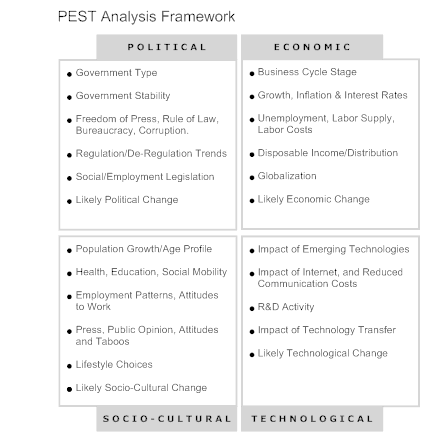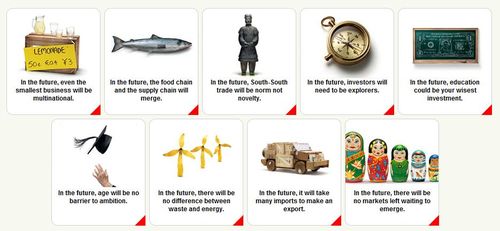
I’ve been debating some future presentations with various folks today, and a little ray of light went off in my head.
The light was triggered by a comment: “can you talk about what impact regulatory change may have on bank to corporate relationships using examples historically?”
The question was really asking about the unintended impact of regulatory change in the past and what it might mean for their future, but it made me think about something else.
Each time we have seen a major bubble burst, the cause has been a coagulation of several forces of change.
Forces for change come from four major directions: Political, Economic, Social and Technological (PEST).

These forces for change are used in many ways, and can be seen in my banking history discussions (and soon to be published book) which talks about many historical periods including the Italian Renaissance, the Great Depression and the Credit Crisis.
In each of these, we can see Political, Economic, Social and Technological forces working together at the same time to drive change.
In the fall of the Renaissance Italians, it was a mixture of change between the break from the Catholic Church with the Protestant and other movements (Political), mixed with the ruin of the Italian banks due to over-extension of credit to overseas Royal Houses (Economic), along with expansion of merchant shipping and colonisation (Technological).
In the Great Depression, we saw the end of the Industrial Revolution (Technological) combined with post-war wrangling over the gold standard (Political and Economic).
Right now, we see a major world of change too.
We have the rebalancing of power between America and Asia/China (Economic) combined with an internet revolution that is connecting everyone on the planet (Technological), leading to changes in society, where a Molly Katchpole can reverse a bank’s policy and an #Occupy movement can change global thinking (Social).
The Political outcome of all of this is what is driving bank regulations right now.
And the outcome of all of this will be a massive change.
A New World Order?
Probably not.
We already have a New World Order as China is expected to be the world’s largest economy by 2018 (ten years ago, it was estimated to be 2047).
But we will see a restructured playing field and one that is not level.
We can see this already as one major economy (America) bans prop trading whilst another (UK) just separates prop trading from retail bank operations.
Even more pronounced are the differences between the US and EU on OTC Derivatives regulations and how to define and regulate Systemically Important Financial Institutions (SiFi).
From CME Group in October 2011:
“In an ideal world, global financial regulators would function something like a team of horses, with policymakers in the United States, Europe, Asia and elsewhere all pulling at once in the same direction, and moving toward a common goal.
“Reality is turning out be far more chaotic, however. Regulators and lawmakers are having a tough time forming a consensus even within their own national borders, let alone across international boundaries. The result is turning out be a patchwork of overlapping and often inconsistent approaches to regulation in the aftermath of the financial crisis that gripped global markets in 2008 and 2009. Many financial experts fear that the inconsistent global regulatory framework will alter the flow of capital around the world, as trades are directed to the cheapest jurisdiction, a process known as regulatory arbitrage.”
So we end up with a world where the politicians are trying to react to the implosion of markets at the end of another revolution – Globalisation – and find that they are seriously lacking consistency, vision, leadership or agreement.
The Eurozone is one of the best illustrations of this, although America and China aren’t guaranteed to come out of this stainless as the American elections will change ground again, as will China’s challenges of a property market bubble and inflationary pressures.
All in all, the PEST approach to the world today says that we are going through a momentous change from all angles – Political, Economic, Social and Technological.
Where will it end up?
Probably in a place no-one expects and one which, on this blog, I’m going to avoid predicting decisively.
From Reuters:
“By 2020, the workforce in western Europe will shrink by 2.4 percent, including a 4.2 percent contraction in Germany, according to a Boston Consulting Group study.
Looking further ahead, HSBC projects that Germany's working population will shrivel by 29 percent by 2050, Russia's by 31 percent and Japan's by 37 percent.
Over the same period, the population of many African countries will double. Nigeria will log a rise of 3 percent a year in its workforce - in contrast to a 1 percent decline in Russia and Japan - and will have as many people as the United States by 2050.
On current projections, Pakistan will be the sixth most-populous nation by the middle of the century. And the Philippines could be the world's 16th-biggest economy, HSBC reckons.”

Chris M Skinner
Chris Skinner is best known as an independent commentator on the financial markets through his blog, TheFinanser.com, as author of the bestselling book Digital Bank, and Chair of the European networking forum the Financial Services Club. He has been voted one of the most influential people in banking by The Financial Brand (as well as one of the best blogs), a FinTech Titan (Next Bank), one of the Fintech Leaders you need to follow (City AM, Deluxe and Jax Finance), as well as one of the Top 40 most influential people in financial technology by the Wall Street Journal's Financial News. To learn more click here...

